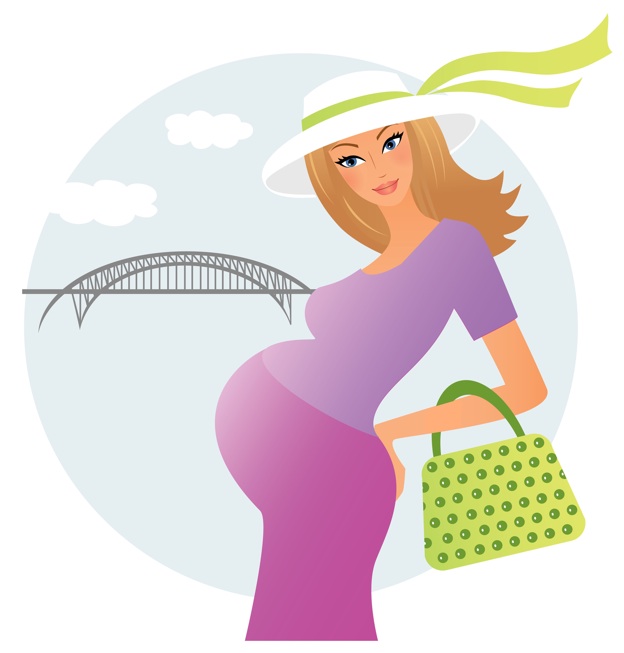SingaporeMotherhood | Pregnancy
December 2012
Yes, You Can Travel During Pregnancy!

Whether you are going for a year-end holiday, a business trip or just your last vacation before you are grounded by Baby’s arrival, overseas travel during pregnancy entails certain risks and should only be undertaken with proper planning and the approval of your obstetrician. The following are some areas which you may like to consider as you plan for your trip.
[banner][/banner]
1. WHERE TO GO
Travelling time
According to an advisory by the Royal College of Obstetricians and Gynaecologists, pregnant women travelling on flights lasting more than eight hours have a higher risk of developing Deep Vein Thrombosis (DVT) compared with those who are not pregnant.
DVT is a condition where a blood clot forms in the leg, calf or pelvis due to sitting still in a cramped position for a long period of time. This can be potentially life threatening if not properly treated. While precautions can be taken to reduce the risks of developing DVT, it may be safer to choose a closer destination with a shorter travel time.
Mode of transport
Some expectant mothers may prefer to cruise on an ocean liner rather than travel by air, rail or road, as they can retreat to their rooms on the ship to rest when needed. However, those with motion sickness may find this mode of transport uncomfortable. Ferry rides may also worsen the nausea experienced by many during their first trimester, especially in rough seas.
Vaccinations
As not all vaccinations are safe during pregnancy, it is best to avoid destinations which require vaccinations prior to travelling. Do also consider the hygiene standards of the places that you would be visiting as you would not want to risk catching water-borne diseases or food poisoning.
Availability of medical care
If you are going to a developing country, ensure that medical care is available and of an acceptable standard in the event of emergencies.
2. WHEN TO GO
First Trimester
Hormonal changes during the first trimester may cause some women to feel nauseous. This can be aggravated by a bumpy coach ride up a winding mountain road or a ferry ride. h3-smelling local food in some Asian countries may also not go down well at this stage.
Before the pregnancy has stabilised, the chances of miscarriage during this stage are higher compared with the next two trimesters. Given these considerations, the first trimester may not be the best time to travel.
Second Trimester
The second trimester is generally considered the most comfortable time during pregnancy. Any nausea would have subsided and the baby is not too large as to cause discomfort. Life usually returns to normal for many women during this trimester, making it the most ideal time to travel.
Third Trimester
With Baby growing heavier, the third trimester is when many pregnancy discomforts set in. Backaches, leg cramps, breathlessness and fatigue may limit the amount of sightseeing or shopping which you can do. There is also an increased risk of premature delivery during this stage compared with the earlier two trimesters.
Many transport providers require a letter from your obstetrician to certify your fitness to travel at this stage. Some impose travel restrictions so check the policies of your transport provider before booking your trip. For example, Royal Caribbean cruises require all travel to be completed before the 24th week of pregnancy, while Bintan Resort Ferries and Tiger Airways set the limit at 28 and 34 weeks, respectively.
3. WHAT TO TAKE NOTE OF
Take safety measures on long trips
If you need to travel for many hours by air, rail or road, follow the advice here to reduce the risk of DVT. When on the road, ensure that you wear your seatbelt correctly at all times.
Avoid strenuous activities
Many doctors advise expectant mothers against carrying heavy luggage or walking too much while travelling as this can put a strain on the body.
Grace, 28, a mother of one, was seven weeks pregnant when she went on a tour of the United States and Canada. As she only discovered her pregnancy a week before travelling and was unable to transfer the package, postpone or cancel the trip without incurring huge costs, she decided to proceed, with caution.
The Senior Financial Assistant shares: “I wore comfortable flat shoes. As advised by my gynaecologist, I tried not to walk too much. If I found a certain place less interesting, I would give it a miss and stay on the coach while waiting for the rest of the group to return.”
In order not to tire herself out during a trip to the factory outlets, Grace “took the directory list and ticked those ‘must go’ shops to buy what I wanted and I stuck to it”. She also took every opportunity to rest on the coach and slept early upon returning to the hotel.
Ensure proper nutrition
As it may not be easy to maintain a balanced diet while on holiday, bring along your prenatal vitamins. Grace brought all her prescribed supplements and dutifully took them on time. Mrs P. Goh, 34, travelled to Malaysia when she was 22 weeks pregnant. To meet her daily requirements for fibre, vitamins and calcium, the homemaker and mother of one bought “sufficient fresh fruits and packet milk from a local supermarket to last my entire trip.”
Avoid food poisoning
While it may be interesting to sample foreign cuisine, this is not the time to patronise that famous roadside stall or to try fried grasshoppers, because of the risk of food poisoning. A list of other types of food to be careful with may be found here.
Mrs Goh recalls: “I only ate at places which looked clean and ordered food that was cooked on the spot. I avoided exposed food like the salads at the hotel buffets and cleaned all my utensils with baby hand and mouth wipes before eating.”
Check out medical facilities and insurance coverage
When planning her trip to Italy, Mrs L. Ng, a realtor in her 30s, checked the location of the hospitals near the areas where she stayed. As she was six months pregnant at the time of travel, she decided to be cautious and “tried to find accommodation that had easy access to transport, such as bus or taxi, in case of emergency.” She also checked the coverage of her travel insurance and kept important telephone numbers handy.
Avoid carrying valuables
As mobility is reduced during the later stages of pregnancy, pregnant women may become “easy prey for petty theft”, Mrs Ng warns. To avoid this, she “tried not to carry more valuables than necessary.”
Dress comfortably
Mrs Ng wore “comfortable shoes for walking and carried a cross body bag to keep the hands free.” Being in a colder climate, she also layered her clothes to keep warm.
Travel wisely
By not taking unnecessary risks (like parasailing or skydiving) or exerting too much physically, and by taking the same precautions as you would when at home, you will be able to have a safe and enjoyable trip during pregnancy. Bon Voyage!
All content from this article, including images, cannot be reproduced without credits or written permission from SingaporeMotherhood.
Follow us on Facebook, Instagram, and Telegram for the latest article and promotion updates.






